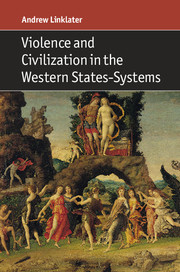Book contents
- Frontmatter
- Epigraph
- Contents
- Preface and Acknowledgements
- Introduction
- 1 The Hellenic City-States System
- 2 New Territorial Concentrations of Power in Antiquity
- 3 The International Relations of Latin Christendom
- 4 The Renaissance City-State System
- 5 The European States-System and the Idea of Civilization
- 6 Cruelty and Compassion in the Age of Empire
- 7 Enlightenment Thought and Global Civilization
- 8 Total Warfare and Decivilizing Processes
- 9 Modernity, Civilization and the Holocaust
- 10 Sovereignty, Citizenship and Humanity in the Global Civilizing Process
- 11 Process Sociology, Civilization and International Society
- Conclusion
- Bibliography
- Index
10 - Sovereignty, Citizenship and Humanity in the Global Civilizing Process
Published online by Cambridge University Press: 28 March 2017
- Frontmatter
- Epigraph
- Contents
- Preface and Acknowledgements
- Introduction
- 1 The Hellenic City-States System
- 2 New Territorial Concentrations of Power in Antiquity
- 3 The International Relations of Latin Christendom
- 4 The Renaissance City-State System
- 5 The European States-System and the Idea of Civilization
- 6 Cruelty and Compassion in the Age of Empire
- 7 Enlightenment Thought and Global Civilization
- 8 Total Warfare and Decivilizing Processes
- 9 Modernity, Civilization and the Holocaust
- 10 Sovereignty, Citizenship and Humanity in the Global Civilizing Process
- 11 Process Sociology, Civilization and International Society
- Conclusion
- Bibliography
- Index
Summary
The peoples of the earth are now confronted by [the] task … of contributing gradually to a renunciation of the traditional warlike institutions through voluntary self-limitation, and perhaps even through voluntary submission to the arbitration of humanity. The mass of human beings, and in particular the leading strata of states, may perhaps gradually advance towards that stage of civilisation. But … the task of achieving a pacification of humanity which is not enforced externally but is based on voluntary decisions remains for the present insoluble.
(Elias 2010c: 145)The principle of sovereignty has been central to European state formation and the process of civilization, and fundamental to the development of the modern society of states from its emergence in Europe to its subsequent enlargement to embrace the entire inhabited world. It was important in legitimating state monopoly powers and in the construction of a unique we–I balance in the international states-system. Indeed, to write a history of sovereignty is effectively to document the development of that balance in the relations between territorial states. Modern conceptions of sovereignty became linked with the principle that states are obliged to comply only with international legal obligations that they have freely imposed on themselves. The general understanding was that acts of self-limitation could be reversed when sovereign states decided that they had become incompatible with core objectives, and when they assumed – as they were legally entitled to do – that it was necessary to use force to protect vital security interests. But that was not how sovereignty was constructed in the early history of the modern states-system and, because of the influence of the European civilizing process, it is not how it is understood today.
The first part of the following discussion notes that political theories that defined sovereignty in terms of absolute rights rather than responsibilities were the product of a long process in which Christian ethical constraints on state power were weakened. They were the outcome of a changing we–I balance that reflected a particular phase in the development of relationships between sovereign powers, international society and humanity.
- Type
- Chapter
- Information
- Violence and Civilization in the Western States-Systems , pp. 384 - 424Publisher: Cambridge University PressPrint publication year: 2017

